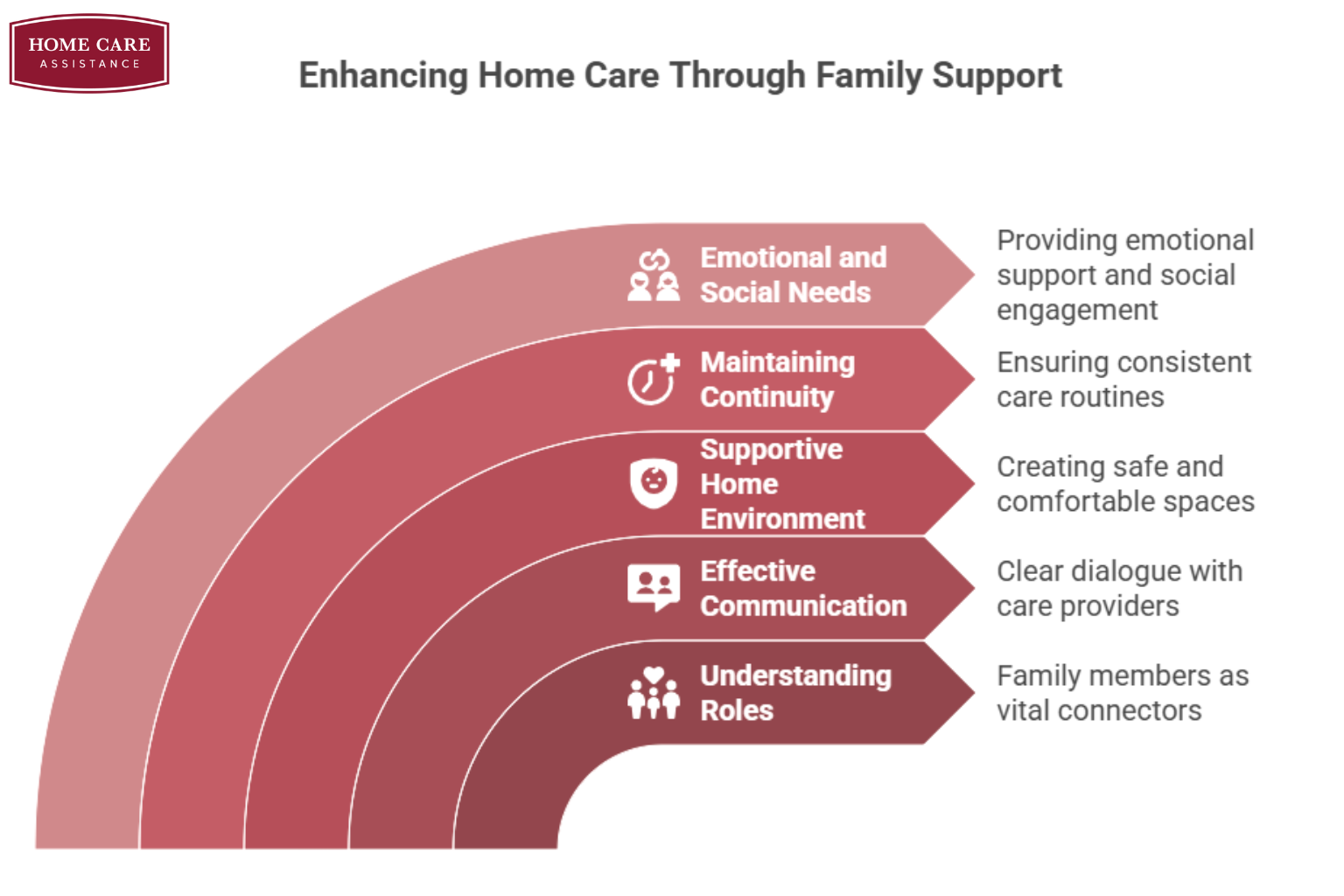Professional home care provides essential medical and personal assistance, but family involvement remains crucial for optimal outcomes. When family members actively participate in care plans, their senior loved ones experience better health results, quality of life, and emotional wellbeing.
Understand Your Role in the Care Team
Family members serve as vital connectors between seniors and professional caregivers. Your intimate knowledge of your loved one’s preferences, routines, and medical history provides invaluable context that enhances the quality of the care you provide.
Key responsibilities include:
- Sharing detailed medical history and current concerns with care providers
- Communicating changes in your loved one’s condition or behavior
- Advocating for your family member’s needs and preferences
- Serving as a liaison when your loved one cannot communicate effectively
Professional caregivers rely on this information to tailor their approach and make informed decisions about daily care routines.
Caring for senior loved ones can be challenging for families who don’t have expertise or professional training in home care, but this challenge doesn’t have to be faced alone. Family caregivers can turn to Anchorage Home Care Assistance for the help they need. We provide high-quality live-in and respite care as well as comprehensive Alzheimer’s, dementia, stroke, and Parkinson’s care.
Communicate Effectively with Care Providers
Clear, consistent communication forms the foundation of successful home care. Establish regular check-ins with nursing staff, therapists, and care coordinators to stay informed about treatment progress and any adjustments needed.
Create a communication system that works for everyone:
- Maintain a shared care journal or digital log.
- Schedule weekly phone calls or video meetings.
- Use messaging apps approved by the care agency.
- Attend care plan meetings when possible.
Document important observations about medication responses, mood changes, or physical symptoms. These details help professional caregivers make informed adjustments to treatment plans.
Create a Supportive Home Environment
Your home environment significantly impacts the effectiveness of professional care services. Simple modifications can enhance safety while supporting therapeutic goals.
Safety considerations include:
- Removing trip hazards like loose rugs or electrical cords
- Installing grab bars in bathrooms and stairways
- Ensuring adequate lighting throughout the home
- Organizing medications in clearly labeled containers
Beyond safety, create spaces that promote comfort and healing. Designate quiet areas for therapy sessions, ensure comfortable seating for exercises, and maintain a calm atmosphere during care visits.
Many seniors prefer aging in place over moving to assisted living facilities. If your senior loved one needs assistance to remain safe and comfortable while living at home, reach out to Home Care Assistance, a leading homecare services agency. Our dedicated in-home caregivers can assist with meal prep, bathing and grooming, exercise, medication reminders, and many other important tasks.
Maintain Care Continuity
Consistency in care routines enhances outcomes and reduces confusion. Work closely with professional caregivers to understand daily schedules, medication timing, and therapy requirements.
During caregiver transitions or schedule changes:
- Provide detailed handoff information to new staff members.
- Maintain consistent mealtimes and daily routines.
- Keep important medical information easily accessible.
- Ensure backup plans exist for emergency situations.
Your presence provides stability and familiarity that helps your loved one feel secure during care transitions.
Manage Emotional and Social Needs
Professional caregivers focus primarily on medical and physical needs, making family involvement essential for emotional support. Your emotional connection cannot be replaced by professional services, regardless of their quality.
Ways to provide emotional support:
- Spend quality time engaging in favorite activities.
- Encourage social connections with friends and extended family.
- Listen actively to concerns and fears.
- Celebrate moments of progress and milestones.
Balance your involvement carefully. While your support is invaluable, avoid micromanaging professional caregivers or undermining their expertise. Trust their clinical judgment while contributing your unique insights about your family member’s personality and preferences.
Regular family meetings with the care team help address concerns, adjust goals, and ensure everyone remains aligned on the best approach for your loved one’s care.
Whether you need respite from your caregiving duties or your aging loved one needs live-in care, Home Care Assistance Anchorage can meet your family’s care needs. Our dedicated caregivers are available around the clock to provide transportation to doctor’s appointments, ensure seniors take their prescribed medications, and help with a variety of tasks in and outside the home. Reach out to one of our Care Managers today at (907) 770-0907 to learn more about our high-quality home care services.

